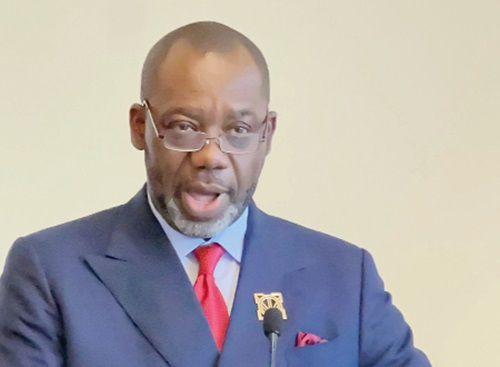
Govt grooming graduates for modern times — Dr Matthew Opoku-Prempeh
The vice presidential candidate of the New Patriotic Party (NPP) for the December 7 elections, Dr Matthew Opoku Prempeh, has emphasised that the government is creating an education environment that equips graduates with skills, knowledge, and the adaptability they need to succeed in a rapidly changing world.
In that regard, he said, the government had since 2017, undertaken bold reforms in higher education, resulting in fundamental changes to policy, regulation, institutional mandates, governance and curricula.
Dr Prempeh, who was speaking at the University of Memphis in the United States of America (USA) last Friday, said education was an important bedrock of a progressive productive country, and key to development.
He said many countries with little or no natural resources had seen remarkable outcomes that turned their countries around and opened up opportunities for all by investing in the education of their citizens.
Dr Prempeh said it followed, therefore, that access and equity were two key elements in the drive to improve teaching and learning outcomes in order to make the desired impact.
By that, he said, “the pathway into education must be with as few barriers as possible to enable a critical mass of citizens to access education”.
That access, he said, must have an equity component so that all children could have an equal opportunity to access the best education possible, irrespective of their backgrounds.
Furthermore, Dr Prempeh said critical factors such as infrastructure, and teaching and learning materials remained critical to achieving the desired access and outcomes of education.
Topic
Dr Prempeh, who spoke on the topic: “Implementing a national policy for educational access and equity”, highlighted the NPP government’s commitment to providing access to education, saying the previous NPP administration between 2001 and 2009 led by President John Agyekum Kufuor took steps to increase access to basic education.
That, he said, included the introduction of the capitation grant, which abolished school fees and provided direct funding to schools to cover operational costs.
The policy, Dr Prempeh indicated, significantly improved primary school enrolment rates, reaching 90 per cent for boys and 87 per cent for girls, while attendance rates during the same period exceeded 60 per cent for both sets.
He said the introduction of the Ghana School Feeding Programme by the Kufuor administration also tackled hunger, malnutrition and low school attendance rates by providing one nutritious meal a day to children in public kindergarten and primary schools.
Beginning as a pilot project in 10 schools, Dr Prempeh said, the programme expanded to benefit over 1.6 million children by 2017. Today, he said, over four million children benefited from the programme.
School enrolment
Dr Prempeh said data from 2013 to 2016 showed that, on average, 100,000 children passed the Basic Education Certificate Examination (BECE) each year, but could not enrol in senior high school (SHS) due to financial constraints.
“This represented about 35 per cent of all placed students. Among those who did enrol, 22 per cent dropped out, again for financial reasons,” he explained.
Within one year of the rolling out of the Free Senior High School policy, he said, the 35 per cent rate of students failing to take up their places was halved to about 17 per cent.
“Indeed, we were so overwhelmed by the numbers that in 2018, we were compelled to introduce the double track system for over 400 of our 721 senior high schools to enable us to absorb the extra numbers,” he stated, adding that “today, over five million children have benefited from this bold programme, with the enrolment transition rate in the northern regions reaching a remarkable 98 per cent.”
He said 140 Ghanaians currently studying at the Memphis University were beneficiaries of the Free SHS policy, indicating that some of them could have fallen off but for the policy.
He said in all of this, the government placed emphasis on the fundamental tenets of the policy and not just on the numbers.
Dr Prempeh said he was proud of that legacy as a past Minister of Education.
Challenges
While acknowledging the challenges that came with the rollout of the policy, Dr Prempeh pointed out that “we will not pretend that challenges do not remain; they do, and we will keep confronting them boldly and honestly, for no challenge is insurmountable”.
“We will continue removing barriers to education at all levels until every Ghanaian child’s education journey shall be determined by his or her abilities, and not the financial circumstances of his or her family,” he said.
“We believe that education must be about giving every Ghanaian child a just beginning in life and opportunities on the back of our quest for active participation in the fourth industrial revolution,” he stressed.
